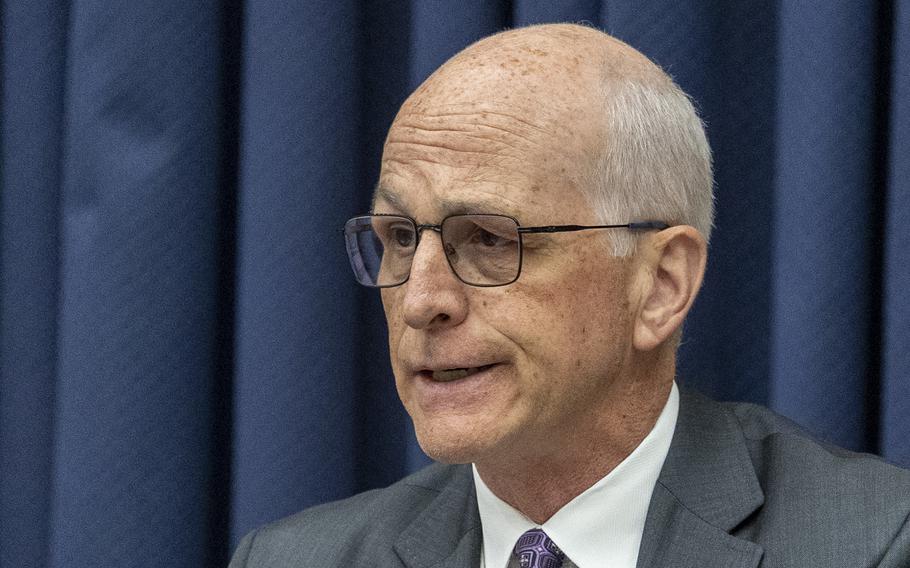
The U.S. Capitol seen through a window of the Cannon House Office Building. (Carlos Bongioanni/Stars and Stripes)
WASHINGTON — The House Armed Services Committee on Tuesday advanced legislation that would invest $150 billion in shipbuilding, a layered missile defense shield and other defense priorities as part of a Republican plan to enact President Donald Trump’s agenda.
The panel voted 35-21 in favor of the bill. It requires the Pentagon to spend the additional funds by October 2034, including nearly $9 billion on renovations to barracks and unaccompanied housing, allowance increases and other quality-of-life improvements for service members.
The bulk of the legislation focuses on boosting the military’s capabilities.
It would provide $34 billion to increase the Navy’s fleet and expand capacity at shipyards, $25 billion to develop a “Golden Dome” system that could defend the U.S. from ballistic missiles that travel at hypersonic speeds, and $20 billion to develop and acquire munitions.
“The time for this level of investment is long overdue,” said Chairman Mike Rogers, R-Ala. “We are currently at the lowest level of defense spending as a percentage of GDP since before World War II. That’s unacceptable. And it must change.”
The measure represents a portion of a massive Republican legislative package tackling immigration enforcement, energy provisions for oil and gas production, the extension of Trump’s 2017 tax cuts, and domestic spending reductions.

Rep. Mike Rogers, R-Ala., chairman the House Armed Services Committee, attends a hearing on Tuesday, April 29, 2025, about increases to defense spending. (Eric Kayne/Stars and Stripes)
Republicans are pushing the bill through Congress using the reconciliation process, which will allow them to bypass Democratic opposition and pass the legislation with a simple majority vote.
Rep. Adam Smith of Washington, the top Democrat on the committee, said he would not support the overall bill, which is projected to add trillions to the deficit and cut into safety-net programs such as Medicaid, and could not trust the Pentagon’s leadership with an additional $150 billion.
“They have not even begun to prove that there is a chance in hell that they will spend this money intelligently, efficiently and effectively,” he said. “Secretary [Pete] Hegseth has proven himself to be completely incapable of doing the job of secretary of defense.”
Rep. Seth Moulton, D-Mass., a former Marine Corps officer, said he wouldn’t trust Hegseth with $20.
“We should not give him a $150 billion blank check,” he said.
Democrats took turns Tuesday criticizing Hegseth for sharing sensitive information on unsecured platforms, purging top staff and presiding over a Defense Department that has banned books and removed photographs in a bid to wipe out all mentions of race and gender.
“The fact that Secretary Hegseth is spending precious time, energy and resources on erasing the history and diversity of our great nation instead of on critical readiness or taking seriously the handling of sensitive national security information only serves to set us back,” said Rep. Sarah Elfreth, D-Md.
Elfreth introduced an amendment to prohibit the censorship or destruction of historical artifacts and documents without an expert review but it failed to pass the committee.
Democrats put forward about 20 amendments to take digs at Hegseth and express their frustration with the Trump administration. The proposals included reducing Hegseth’s salary to $1, putting him through a managerial training program, blocking money for a makeup studio for Hegseth at the Pentagon, and preventing the rumored consolidation of certain combatant commands.
All were shot down.
Republicans lauded the legislation that they crafted as a historic effort to modernize the military after what they said was years of underinvestment. They also said the bill would strengthen deterrence against China, Russia, Iran and North Korea and revive an atrophied defense industrial base.
About $20 billion would be spent on restocking munitions and expanding the domestic production and refinement of rare earth and critical minerals that are primarily sourced from China and used to build fighter jets, submarines and other weapons.
The bill notably allocates billions to accelerate the deployment of low-cost drones, Rogers said.
“These unmanned air, surface and underwater systems are the key to victory on future battlefields,” he said. “I am pleased we are making such a significant investment in them today.”
Other spending would include $11 billion to provide more resources to the Indo-Pacific Command, $7 billion to acquire and modernize aircraft, and $5 billion to pay for the military’s role in helping the Department of Homeland Security secure the U.S.-Mexico border.
The $9 billion earmarked for service members and their families would pay for housing renovations, provide supplemental payments of basic housing allowances, extend eligibility for the temporary lodging expense allowance from 14 to 21 days, and expand various programs for education, child care and professional licenses.
As the markup of the legislation concluded Tuesday, Smith issued a statement chastising the committee’s Republican members for failing to engage with the hourslong discussion. The only Republican who spoke was Rogers, the chairman.
“They didn’t even try to defend what Trump and Hegseth are doing at the [Defense Department] and to our national security. Maybe that’s because they know it is not defensible,” Smith said. “And worse, they seem completely uninterested in doing their jobs as members of this committee — exercising oversight of the Department of Defense. They have outsourced that job to Elon Musk.”

Rep. Adam Smith of Washington, the top Democrat on the House Armed Services Committee, makes his opening remarks on Tuesday, April 29, 2025, at a hearing to discuss increases to defense spending. (Eric Kayne/Stars and Stripes)
Republican committee members stuck with social media to voice their support for the legislation.
“Washington’s complacency has left America weaker and our adversaries stronger,” Republican Pat Harrigan of North Carolina, a former Green Beret, wrote on X. “Today, [House Armed Services Committee Republicans] are rebuilding what matters: new ships, stronger missile defense, a revitalized military, and the industrial base to sustain it.”